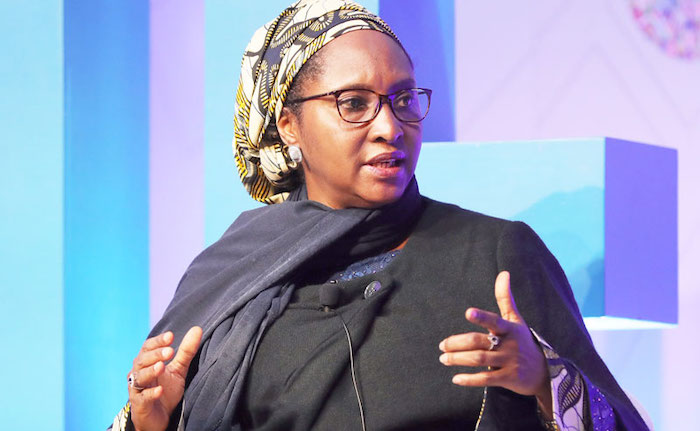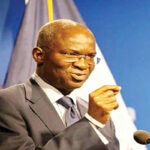
TYPICAL of the government’s habit of denial, the Minister of Finance, Budget and National Planning, Zainab Ahmed, sought last week to downplay the country’s economic problems. Insisting that “Nigeria is not broke,” she cited the “interplay of external and internal causes” for the current adverse economic situation but said the general outlook remained strong and healthy. Beyond the semantics, facts on the ground belie this assertion; the country’s public finances are precarious, requiring frantic and novel measures to avoid a disastrous climax.
Contrary to the illusion of wellbeing the minister laboured to portray, the headwinds buffeting the economy, assaulting businesses, laying waste to the real sector, and impoverishing the majority demand a greater sense of urgency from the President, Major General Muhammadu Buhari (retd.), and regime officials.
Though the Debt Management Office put total outstanding public debt at N42.84 trillion by June 30, analysts estimate that ongoing and planned borrowings would push this figure to about N71.5 trillion by mid-2023. With revenues falling far short of recurrent and capital spending needs, the government borrows to pay salaries, fund its agencies and service debts. In the 10 months to October 2022, it took N6.31 trillion from the Central Bank of Nigeria, through the fraught ‘Ways and Means’ channel, raising its total borrowing from the Bank to N23.77 trillion.
Ahmed, presenting the regime’s economic scorecard, anchored the pass mark on three broad planks: that it continues to generate revenue; has not defaulted on loan repayments; and is not planning to restructure its debts.
Technically, she is right. Finance experts adjudge a country bankrupt when it fails to make debt and interest payments when they fall due. Business Standard of India recalls that Brazil, Mexico, Uruguay, Chile, Russia, Spain and Costa Rica and mighty United States (five times) have at various times declared bankruptcy. So have Germany (eight times), China and the United Kingdom (four times each), and Japan (twice). Most recently, Lebanon defaulted in March 2020 on its $90 billion debt, described by the IMF as one of the worst cases globally in 150 years; Sri Lanka defaulted on its $51 billion debt in April this year.
The Buhari regime is taking comfort in its not missing debt repayment so far. Ahmed also cited improvement in non-oil revenue, and a curtailment in the massive stealing of crude oil in recent weeks. Crude theft of over 400,000 barrels daily had reduced export revenue, rendering Nigeria unable to benefit from the high prices provoked by the Russian-Ukraine war.
But there is little else to cheer, and a default could well happen without better management of the economy. Nigeria is not defaulting on its external debts yet, but domestic debts are another matter. Apart from total domestic debt standing at N20.95 trillion by June 30, the DMO said domestic debt servicing rose to N5.24 trillion in the 30 months to June. The Minister of Works and Housing, Babatunde Fashola, revealed last month that highway contractors were owed N11.16 trillion. The N25 billion earmarked in the proposed 2023 budget to pay off local contractors will hardly make a dent on this.
Buhari needs to pay greater attention. In November, Fitch, the global credit rating agency, downgraded Nigeria’s credit rating from B to B-; at par with Ecuador and Angola that are also in tight fiscal corners. Moody’s, another rating giant, had earlier downgraded the country to B3, down from B2. Standard & Poor’s in August affirmed Nigeria’s score at B-; itrated Brazil BB-, and South Africa BB. Fitch rated Egypt B2. Unlike the Federal Government, others fret. Bloomberg bluntly warned that the country’s fiscal status could be heading towards junk.
Ahmed admitted that the debt servicing took 93 per cent of all revenue in 2020; it will take up to 92 per cent in 2022, reckons the IMF, while the government plans to spend over 60 per cent of budgeted revenue in 2023 on debt service obligations.
Many therefore do not share the government’s upbeat mood. While it has avoided the technical threshold of bankruptcy, experts say the country is caught in the vortex of a financial crisis, where revenues fall short of expenditure, resulting in massive deficits and even more borrowing. A country borrowing just to keep governance going and to service previous borrowings cannot afford to be complacent.
Buhari should do more to diversify revenue and exports; there should be drastic cuts in the cost of governance through personnel downsizing and scrapping of redundant agencies.
The government should plug the immense revenue leakages that according to the House of Representatives resulted in losses of $30 billion annually between 2005 and 2019. The tax collection machinery is weak, corrupt, and outdated. Revenue-generating agencies, especially the Nigerian National Petroleum Company Limited, continue to withhold revenue from the treasury without consequences.
Buhari should unlock the immense potential of private capital by privatising state-owned commercial assets, liberalising all sectors of the economy, reforming the chaotic foreign exchange market, and radically improving the ease of doing business. Corruption should be neutralised.
There is more importantly, a need for an attitudinal change; stop downplaying or misdiagnosing the problems; instead, nip them in the bud. For years, the government kept relishing Nigeria’s low debt-to-GDP ratio instead of taking measures to keep it low. It woke up late to realise that revenue-to-GDP ratio at about 7.3 per cent, described as the lowest in the world by the World Bank in July 2021, is more critical. The global lender prescribes a minimum of between 15 and 20 per cent for sustainability.
Borrowing must be curbed: the government’s claim that its debts are sustainable is disputed by the World Bank and the IMF that insist on the removal of the petrol subsidy and dual exchange rates to reduce the need for borrowing.
Unless drastic, realistic measures are taken to improve revenue intake, debt repayment default and bankruptcy could follow. Nigeria being decidedly more fragile today, the fallout could tip it over the edge. Buhari should act decisively.




